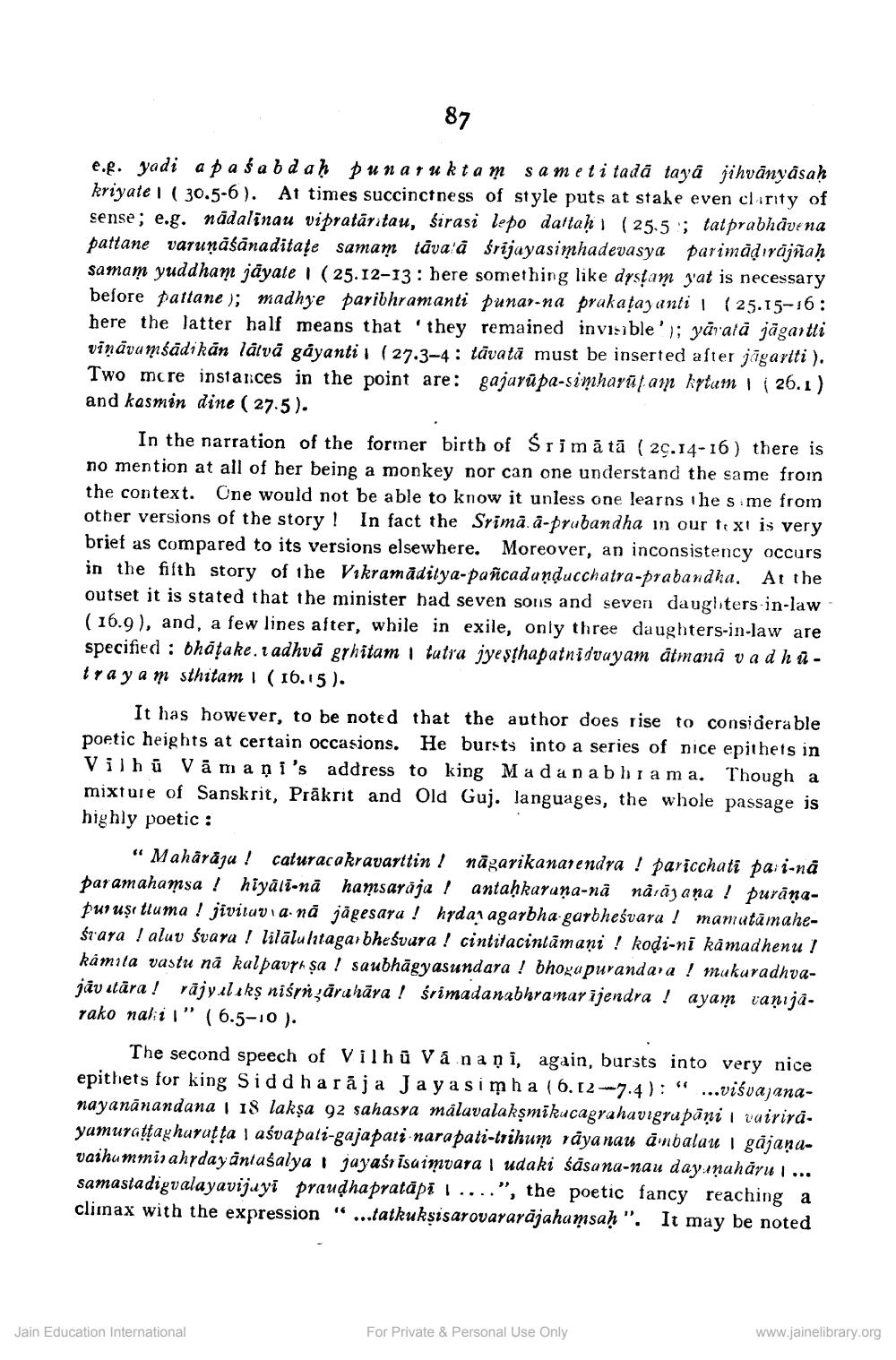________________
e.g. yadi a pa śabdah puna rukt am sameti tadā tayà jihvánvásah kriyate i ( 30.5-6). At times succinctness of style puts at stake even clarity of sense; e.g. nädalinau viprataritau, śirasi lepo daftaħ (25.5; tatprabhāve na pattane varuņāśānaditațe samam tāva'à śrijayasimhadevasya parimadıräjñaḥ samam yuddham jāyate 1 ( 25.12-13: here something like dysțam yat is necessary before pattane ); madhye paribhramanti punar-na prakațayanti i (25.15-16: here the latter half means that they remained invisible'); pāralā jāgartti viņāvumśädikān látvā gayanti (27.3-4: lāvatā must be inserted after jigartti ). Two more instances in the point are: gajarūpa-simharúfair kylam ! ( 26.1) and kasmin dine (27.5).
In the narration of the former birth of Śrimātā (20.14-16) there is no mention at all of her being a monkey nor can one understand the same froin the context. One would not be able to know it unless one learns the s me from other versions of the story! In fact the Srima. a-prubandha in our text is very brief as compared to its versions elsewhere. Moreover, an inconsistency occurs in the fifth story of the Vikramaditya-pañcadanducchatra-prabandha. At the outset it is stated that the minister had seven sons and seven daughters-in-law (16.9), and, a few lines after, while in exile, only three daughters-in-law are specified : bhāțake. i adhvá gyhitam 1 tatra jyeșthapatnīduuyam átmana vadhu - tray a m sthitam I ( 16.15).
It has however, to be noted that the author does rise to considerable poetic heights at certain occasions. He bursts into a series of nice epithets in Vilh u Vām a ņi's address to king Madan abbiama. Though a mixture of Sanskrit, Prākrit and Old Guj. languages, the whole passage is highly poetic :
“Mahāraju! caturacakravarttin ! nāgarikanarendra ! paricchati paji-nå paramahamsa ! hiyali-nā hamsaraja ! antahkarana-na nåājana ! puranapui uși tłuma ! jivituvia na jāgesara ! hydan agarbha garbheśvaru ! mamatāmaheśrara ! aluv śvara ! lilāluhtaga, bheśvara ! cintilacintamani ! kodi-ni kamadhenu ! kamata vastu nā kalpavrașa! saubhāgyasundara ! bhogapurandara ! mukuradhvajävitāra! rājyaliks nisrnjarahāra ! srimadanabhramar ijendra ! ayam vanijayako nalii ” ( 6.5-10).
The second speech of Vilhů anani, again, bursts into very nice epithets for king Siddharāja Ja ya simha (6.12 -7.4):" ...visvajananayanānandana | 18 laksa 92 sahasra målavalakşmikucagrahavigrupāni I vairira. yumurattaghurutta | aśvapali-gajapati narapati-trihum raya nau ambalau i gåjanavaihummis ahrday antasalya jayaśı isaimuara | udaki śasana-nau dayanaharu i ... samastadigvalayavijuyi praudhapratāpi 1...., the poetic fancy reaching a climax with the expression “...tatkuksisarovararajahamsah ". It may be noted
For Private & Personal Use Only
Jain Education International
www.jainelibrary.org




